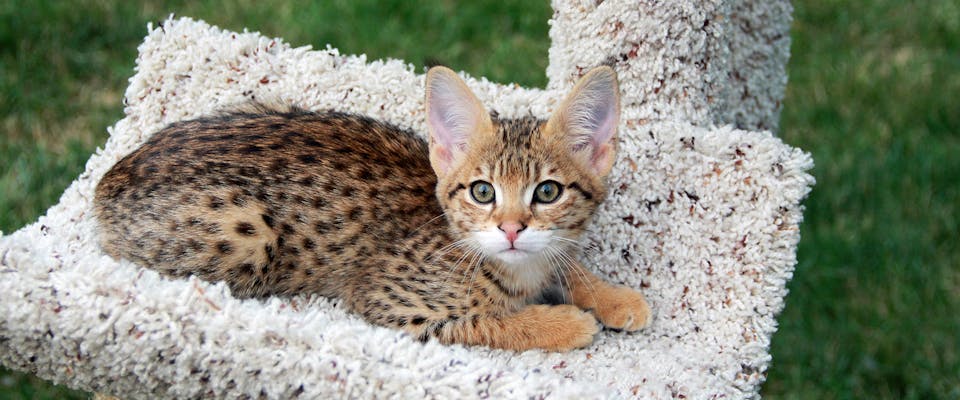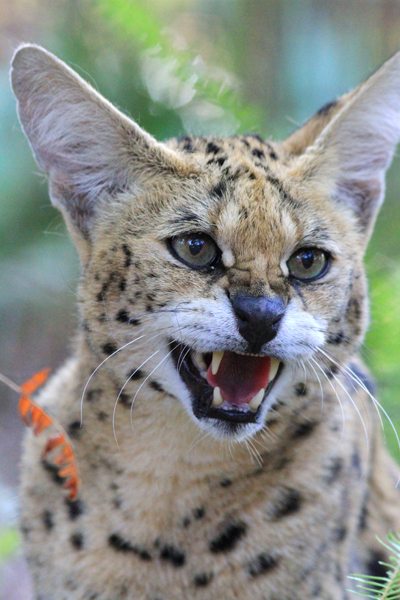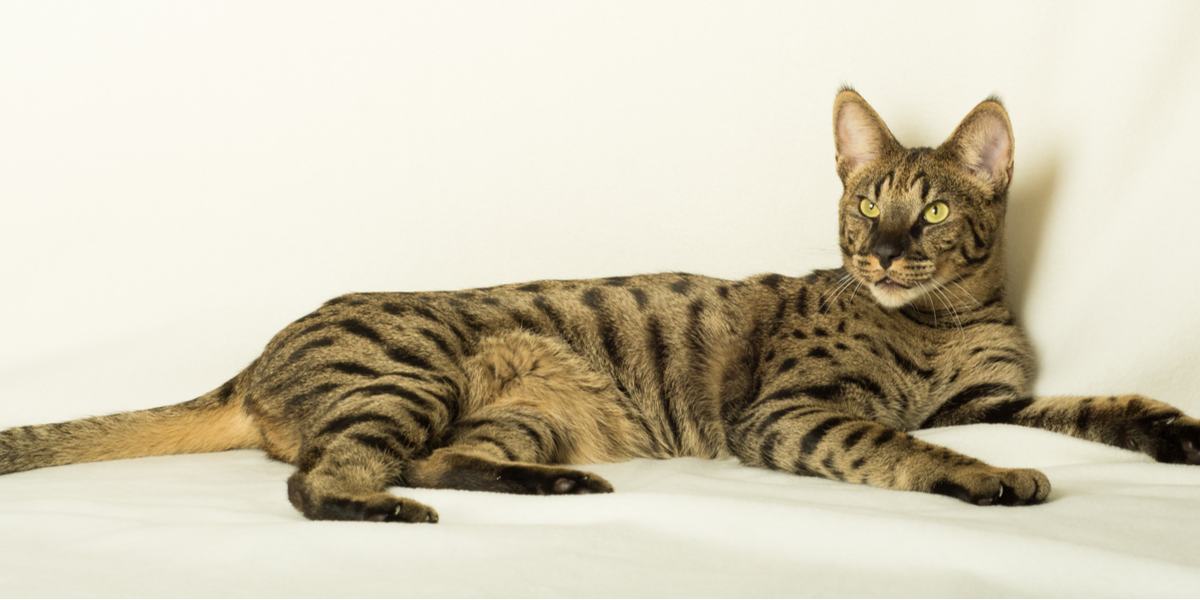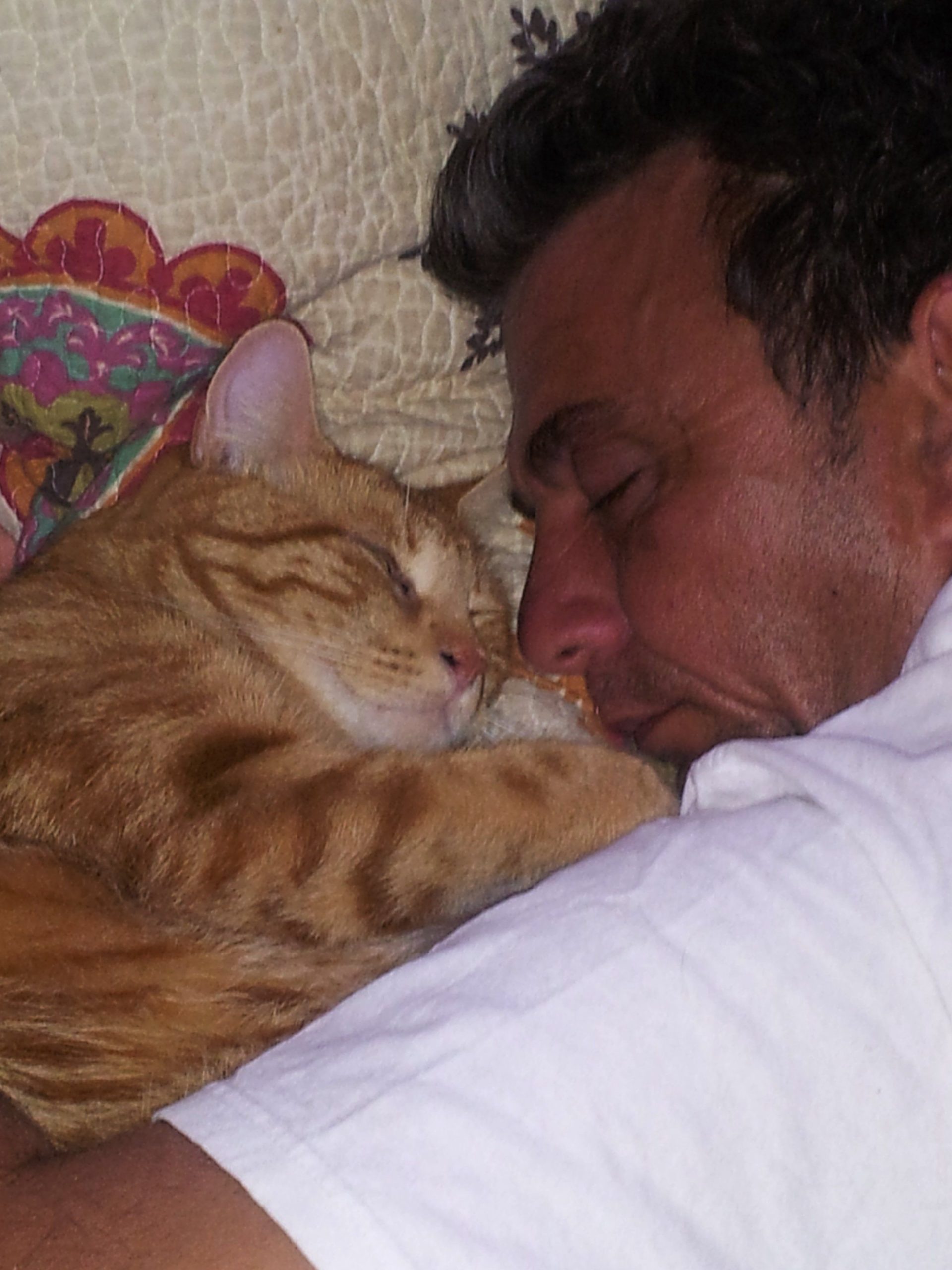Contents
- I. Introduction to Savannah Cats
- II. Characteristics of Savannah Cats
- III. Natural Hunting Instincts of Savannah Cats
- IV. Savannah Cats and Their Prey
- V. The Hunting Techniques of Savannah Cats
- VI. Frequently Asked Questions about Savannah Cats
- 1. What is a Savannah cat?
- 2. Are Savannah cats good pets?
- 3. What kind of care do Savannah cats require?
- 4. Are Savannah cats good with children and other pets?
- 5. How big do Savannah cats get?
- 6. Do Savannah cats need a lot of exercise?
- 7. Are Savannah cats legal to own?
- 8. How long do Savannah cats live?
I. Introduction to Savannah Cats

Savannah cats are a unique and fascinating breed of domestic cat that have gained popularity in recent years. They are known for their striking appearance, which resembles that of a wild African serval. This hybrid breed is the result of crossing a serval with a domestic cat, resulting in a beautiful and intelligent feline companion.
One of the most noticeable features of Savannah cats is their large size. They are considered one of the largest domestic cat breeds, with males reaching up to 20 pounds or more. Their long legs and slim body give them a graceful and agile appearance. Additionally, their coat comes in a variety of colors and patterns, adding to their allure.
Savannah cats are not only visually stunning, but they also possess a highly active and curious nature. They require plenty of mental and physical stimulation to thrive. Engaging them in play and providing them with interactive toys can help fulfill their need for stimulation and prevent boredom.
Their Unique Personality
When it comes to personality, Savannah cats are known for their dog-like traits. They are often described as loyal, social, and outgoing. Unlike some other cat breeds, Savannah cats enjoy being around their human companions and may even follow them around the house. They are known to form strong bonds with their owners and can be quite affectionate.
Furthermore, Savannah cats are highly intelligent and curious. They love to explore their surroundings and are known for their problem-solving abilities. They enjoy interactive games and puzzles that challenge their minds. This intelligence, combined with their natural hunting instincts, makes them excellent hunters and provides them with hours of entertainment.
Special Care Requirements
Due to their exotic heritage, Savannah cats have a few special care requirements. They need a spacious and stimulating environment to thrive. Providing them with tall cat trees, scratching posts, and interactive toys can help satisfy their natural instincts. Additionally, they require a balanced diet that meets their nutritional needs.
It’s also important to note that Savannah cats may have different legal restrictions depending on your location. Some areas may require permits or have specific regulations regarding ownership. It’s essential to research and understand the laws and regulations in your area before bringing a Savannah cat into your home.
II. Characteristics of Savannah Cats

Savannah cats are a unique breed that has gained popularity in recent years. Combining the elegance of a wild African serval with the domestic nature of a house cat, these feline companions have distinct characteristics that set them apart from other breeds. If you’re considering bringing a Savannah cat into your home, here are some key traits to know:
1. Exotic Appearance
One of the most striking features of Savannah cats is their exotic appearance. With their long legs, slender bodies, and large, rounded ears, they resemble their serval ancestors and often draw attention wherever they go. Their unique coat patterns, which can range from bold spots to marbled stripes, further enhance their distinctive look.
2. High Energy Levels
Savannah cats are known for their abundant energy. These playful creatures require plenty of mental and physical stimulation to keep them happy and healthy. Expect them to be constantly on the move, exploring their surroundings and engaging in interactive play. Providing them with toys, scratching posts, and regular exercise will help channel their energy in a positive way.
3. Affectionate Nature
Despite their wild appearance, Savannah cats can be incredibly affectionate towards their owners. They form strong bonds and enjoy being part of the family. Don’t be surprised if your Savannah cat follows you around the house or greets you at the door. They crave attention and enjoy cuddling up on your lap or snuggling beside you during bedtime.
4. Intelligent and Curious
Savannah cats are highly intelligent and have a natural curiosity that drives their behavior. They love to explore and investigate their surroundings, often getting into mischief if left unattended. These cats are quick learners and are known to be trainable, responding well to positive reinforcement techniques. Providing them with mental stimulation through puzzle toys and interactive games will keep their minds sharp.
5. Active Hunters
Due to their wild heritage, Savannah cats have a strong hunting instinct. They possess the agility and athleticism of their serval ancestors, making them excellent climbers and jumpers. It’s important to provide them with opportunities to satisfy their hunting instincts by providing interactive toys and play sessions that mimic the thrill of the chase.
III. Natural Hunting Instincts of Savannah Cats

Savannah cats are known for their strong and innate hunting instincts. These instincts are deeply rooted in their wild ancestors, the African Serval. Understanding the natural hunting behaviors of Savannah cats can give us insight into their behavior as domestic pets.
1. Keen Observation Skills
Savannah cats possess exceptional observation skills, constantly scanning their surroundings for potential prey. Their sharp eyesight allows them to spot even the smallest movements, making them highly efficient hunters.
2. Stealth and Patience
When it comes to hunting, Savannah cats are masters of stealth. They have the ability to move silently and patiently stalk their prey, mimicking the behaviors of their wild counterparts. This skill allows them to get close to their target without being detected.
3. Impressive Speed and Agility
Once in position, Savannah cats rely on their incredible speed and agility to launch a successful attack. They can sprint at remarkable speeds and make quick turns, ensuring that their prey has little chance of escape.
4. Powerful Pouncing Abilities
One of the most fascinating hunting behaviors of Savannah cats is their ability to pounce. They have strong hind legs, allowing them to leap great distances and land precisely on their target. This technique is a crucial part of their hunting strategy.
5. Versatile Diet
Savannah cats have a diverse diet that includes small mammals, birds, reptiles, and insects. Their hunting instincts enable them to adapt to various environments and food sources, making them highly adaptable predators.
IV. Savannah Cats and Their Prey

Savannah cats, known for their stunning appearance and wild nature, have a strong hunting instinct. They are a hybrid breed resulting from the crossing of a domestic cat and a serval, a wild African cat. This unique combination gives them exceptional hunting skills and agility.
Savannah Cats’ Hunting Techniques
Savannah cats are natural-born predators, and their hunting techniques are quite impressive. They display a combination of stalking, pouncing, and chasing to catch their prey. Their long legs and lean bodies allow them to cover great distances swiftly, making them effective hunters.
Versatile Prey
These magnificent felines have a wide range of prey they are capable of hunting. Their diet consists of small to medium-sized animals such as birds, rodents, reptiles, and even insects. Due to their wild ancestry, Savannah cats have a particular affinity for birds.
Impressive Hunting Success Rate
Savannah cats exhibit an exceptional hunting success rate, thanks to their natural instincts and physical abilities. With their heightened senses, including exceptional eyesight and hearing, they can detect prey from a considerable distance. Once they spot their target, they patiently observe, waiting for the perfect moment to strike.
The Importance of Playtime
To satisfy their hunting instincts and keep them stimulated, it is crucial to provide Savannah cats with plenty of playtime. Engaging them in interactive play sessions with toys that mimic prey can help channel their energy and prevent destructive behavior.
Keeping Savannah Cats Indoors
While Savannah cats possess remarkable hunting skills, it is essential to keep them indoors for their safety and the preservation of local wildlife. Allowing them to roam freely can pose a threat to smaller animals and birds in the area. Providing them with a stimulating environment and engaging play opportunities indoors can help satisfy their hunting instincts.
V. The Hunting Techniques of Savannah Cats

Savannah cats are known for their exceptional hunting skills. These hybrid cats inherit their hunting instincts from their wild ancestor, the African serval. Here are some fascinating hunting techniques employed by Savannah cats:
1. Stalking and Ambushing
Just like their wild counterparts, Savannah cats are masters of stalking and ambushing their prey. They rely on their remarkable agility and camouflage to quietly approach their target. With their muscular bodies and long legs, they can swiftly move through tall grass or leap onto unsuspecting prey.
2. Pouncing
Once Savannah cats have successfully stalked their prey, they employ the pouncing technique. This involves a rapid and forceful leap towards their target, using their powerful hind legs to launch themselves forward. Their acute sense of timing enables them to catch their prey off guard, increasing their chances of a successful hunt.
3. Chasing
When hunting smaller prey such as birds or insects, Savannah cats may engage in a thrilling chase. They possess incredible speed, capable of reaching up to 30 miles per hour. Their long legs and lean bodies give them an advantage in pursuit, allowing them to quickly close in on their target.
4. Tree Climbing
In their natural habitat, African servals are skilled tree climbers, and Savannah cats retain this ability. They can effortlessly scale trees to access prey that has taken refuge above ground. Their strong claws and agile bodies make them adept at maneuvering through branches and perching on tree limbs.
5. Problem Solving
Savannah cats exhibit high levels of intelligence, which they utilize during hunts. They are known for their problem-solving abilities, often strategizing to outsmart their prey. Whether it’s navigating obstacles or anticipating the movements of their target, these cats demonstrate adaptability and resourcefulness in their hunting techniques.
VI. Frequently Asked Questions about Savannah Cats
Savannah cats are a unique and fascinating breed that have gained popularity in recent years. As with any new pet, potential owners often have questions about their characteristics, care, and behavior. In this section, we will answer some frequently asked questions about Savannah cats to help you better understand these incredible felines.
1. What is a Savannah cat?
A Savannah cat is a crossbreed between a domestic cat and a serval, a wild African cat. They are known for their striking appearance, which includes tall ears, long legs, and a spotted or marbled coat.
2. Are Savannah cats good pets?
Yes, Savannah cats can make great pets for the right owner. They are intelligent, active, and social cats that require plenty of mental and physical stimulation. However, they may not be suitable for everyone due to their high energy levels and specific care needs.
3. What kind of care do Savannah cats require?
Savannah cats need a stimulating environment with plenty of toys, climbing structures, and interactive playtime. They also require a balanced diet, regular veterinary check-ups, and mental stimulation to keep them happy and healthy.
4. Are Savannah cats good with children and other pets?
Savannah cats can be good with children and other pets if they are properly socialized from a young age. However, it’s important to supervise interactions and teach children how to handle the cat gently to prevent any accidents.
5. How big do Savannah cats get?
Savannah cats can vary in size depending on the generation and individual genetics. On average, they can range from 8 to 20 pounds or more. Some Savannah cats can even reach up to 30 pounds.
6. Do Savannah cats need a lot of exercise?
Yes, Savannah cats are highly active and require plenty of exercise. They enjoy interactive play sessions, such as chasing toys or playing fetch. Providing them with a variety of toys and opportunities for physical activity is essential.
7. Are Savannah cats legal to own?
The legal status of owning a Savannah cat varies depending on the location. Some states or countries have restrictions or specific regulations regarding ownership. It’s important to research and understand the laws in your area before considering a Savannah cat as a pet.
8. How long do Savannah cats live?
Savannah cats have a relatively long lifespan compared to other domestic cats. On average, they can live between 12 and 20 years with proper care and attention to their health needs.
By answering these frequently asked questions, we hope to have provided you with a better understanding of Savannah cats and their unique characteristics. If you’re considering adding one to your family, make sure to research and consult with reputable breeders or rescue organizations to find the perfect companion for you.

Jackson is an accomplished content writer with a flair for captivating storytelling. With a Bachelor’s degree in English Literature from the prestigious University of California, Berkeley, Hunter’s educational background has honed his writing skills to perfection. His love for felines is evident in his extensive knowledge of cat behavior and care, making him an expert in the field. Hunter’s passion for cats has led him to contribute insightful articles to various online platforms, providing valuable information and tips to cat owners worldwide. With his exceptional writing abilities and deep understanding of cats, Hunter continues to create engaging content that resonates with readers and leaves a lasting impact.
